
Faculdade de Medicina de Ribeirão Preto
Encyclopedia
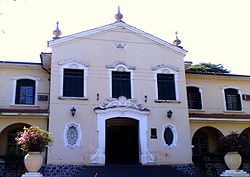
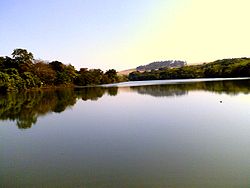
Portuguese language
Portuguese is a Romance language that arose in the medieval Kingdom of Galicia, nowadays Galicia and Northern Portugal. The southern part of the Kingdom of Galicia became independent as the County of Portugal in 1095...
) is a medical school
Medical school
A medical school is a tertiary educational institution—or part of such an institution—that teaches medicine. Degree programs offered at medical schools often include Doctor of Osteopathic Medicine, Bachelor/Doctor of Medicine, Doctor of Philosophy, master's degree, or other post-secondary...
of the University of São Paulo
University of São Paulo
Universidade de São Paulo is a public university in the Brazilian state of São Paulo. It is the largest Brazilian university and one of the country's most prestigious...
(USP) located in the city of Ribeirão Preto
Ribeirão Preto
Ribeirão Preto is a municipality and city in the Northeastern region of the state of São Paulo in Brazil. It is nicknamed Brazilian California, because of a combination of an economy based on agrobusiness plus high technology, wealth and sunny weather all year long. With 605,114 inhabitants,...
, state of São Paulo
São Paulo (state)
São Paulo is a state in Brazil. It is the major industrial and economic powerhouse of the Brazilian economy. Named after Saint Paul, São Paulo has the largest population, industrial complex, and economic production in the country. It is the richest state in Brazil...
, Brazil
Brazil
Brazil , officially the Federative Republic of Brazil , is the largest country in South America. It is the world's fifth largest country, both by geographical area and by population with over 192 million people...
, founded 1952. It is considered one of the three best medical schools in the country and a premier medical research center.
Its main campus
Campus
A campus is traditionally the land on which a college or university and related institutional buildings are situated. Usually a campus includes libraries, lecture halls, residence halls and park-like settings...
is located in a charming old coffee
Coffee
Coffee is a brewed beverage with a dark,init brooo acidic flavor prepared from the roasted seeds of the coffee plant, colloquially called coffee beans. The beans are found in coffee cherries, which grow on trees cultivated in over 70 countries, primarily in equatorial Latin America, Southeast Asia,...
farm
Farm
A farm is an area of land, or, for aquaculture, lake, river or sea, including various structures, devoted primarily to the practice of producing and managing food , fibres and, increasingly, fuel. It is the basic production facility in food production. Farms may be owned and operated by a single...
in the outskirts of the city, with a total built area of 38,205 m², (411,235 ft²) including a small lake. It has a central building with the main departments for the basic medical sciences and an adjoining University Hospital, with 847 beds. In 2003, the hospital
Hospital
A hospital is a health care institution providing patient treatment by specialized staff and equipment. Hospitals often, but not always, provide for inpatient care or longer-term patient stays....
provided in-patient care to 33,973 persons and out-patient (ambulatory) care to approximately 588,000. All medical care is provided free of charge.
History
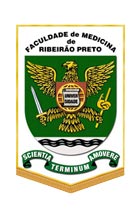
Zeferino Vaz
Zeferino Vaz led the construction, establishment and development of the Unicamp university, in the interior of the State of São Paulo, Brazil in the 1960s and 1970s...
was nominated as its chairman and later became the Faculty's first dean
Dean (education)
In academic administration, a dean is a person with significant authority over a specific academic unit, or over a specific area of concern, or both...
, remaining until 1964. With great foresight, and against many resistances of the traditional medical academic establishment, he advocated a modern, research
Research
Research can be defined as the scientific search for knowledge, or as any systematic investigation, to establish novel facts, solve new or existing problems, prove new ideas, or develop new theories, usually using a scientific method...
-based school, with all professors with full time dedication. This was unheard of at that time in Brazil: in this Vaz was trying to follow the most successful American medical schools, such as Johns Hopkins Medical School. Lacking the researchers and professors with the mentality and experience he needed, he resorted to inviting them from Europe
Europe
Europe is, by convention, one of the world's seven continents. Comprising the westernmost peninsula of Eurasia, Europe is generally 'divided' from Asia to its east by the watershed divides of the Ural and Caucasus Mountains, the Ural River, the Caspian and Black Seas, and the waterways connecting...
and USA.
The school campus was established in a beautiful wooded area in the outskirts of Ribeirão Preto, which was formerly the seat of a state technical agricultural school, and before that, a coffee
Coffee
Coffee is a brewed beverage with a dark,init brooo acidic flavor prepared from the roasted seeds of the coffee plant, colloquially called coffee beans. The beans are found in coffee cherries, which grow on trees cultivated in over 70 countries, primarily in equatorial Latin America, Southeast Asia,...
farm. In the beginning, since the city still lacked adequate resources for housing the professors, several house
House
A house is a building or structure that has the ability to be occupied for dwelling by human beings or other creatures. The term house includes many kinds of different dwellings ranging from rudimentary huts of nomadic tribes to free standing individual structures...
s in a Mediterrean style were built and furnished for free, thus compensating for the relatively small salaries that were paid to them at that time.
By means of such drive to excellence, soon the Medical School of Ribeirão Preto achieved prominence and a unique status in Brazil.
Departments
- Cellular and Molecular BiologyMolecular biologyMolecular biology is the branch of biology that deals with the molecular basis of biological activity. This field overlaps with other areas of biology and chemistry, particularly genetics and biochemistry...
and Pathogenic Bioagents - BiomechanicsBiomechanicsBiomechanics is the application of mechanical principles to biological systems, such as humans, animals, plants, organs, and cells. Perhaps one of the best definitions was provided by Herbert Hatze in 1974: "Biomechanics is the study of the structure and function of biological systems by means of...
Medicine and RehabilitationPhysical therapyPhysical therapy , often abbreviated PT, is a health care profession. Physical therapy is concerned with identifying and maximizing quality of life and movement potential within the spheres of promotion, prevention, diagnosis, treatment/intervention,and rehabilitation...
of the Locomotor Apparatus - BiochemistryBiochemistryBiochemistry, sometimes called biological chemistry, is the study of chemical processes in living organisms, including, but not limited to, living matter. Biochemistry governs all living organisms and living processes...
and ImmunologyImmunologyImmunology is a broad branch of biomedical science that covers the study of all aspects of the immune system in all organisms. It deals with the physiological functioning of the immune system in states of both health and diseases; malfunctions of the immune system in immunological disorders ; the... - SurgerySurgerySurgery is an ancient medical specialty that uses operative manual and instrumental techniques on a patient to investigate and/or treat a pathological condition such as disease or injury, or to help improve bodily function or appearance.An act of performing surgery may be called a surgical...
and AnatomyAnatomyAnatomy is a branch of biology and medicine that is the consideration of the structure of living things. It is a general term that includes human anatomy, animal anatomy , and plant anatomy... - Internal medicineInternal medicineInternal medicine is the medical specialty dealing with the prevention, diagnosis, and treatment of adult diseases. Physicians specializing in internal medicine are called internists. They are especially skilled in the management of patients who have undifferentiated or multi-system disease processes...
- PharmacologyPharmacologyPharmacology is the branch of medicine and biology concerned with the study of drug action. More specifically, it is the study of the interactions that occur between a living organism and chemicals that affect normal or abnormal biochemical function...
- PhysiologyPhysiologyPhysiology is the science of the function of living systems. This includes how organisms, organ systems, organs, cells, and bio-molecules carry out the chemical or physical functions that exist in a living system. The highest honor awarded in physiology is the Nobel Prize in Physiology or...
- GeneticsGeneticsGenetics , a discipline of biology, is the science of genes, heredity, and variation in living organisms....
- Gynecology and ObstetricsObstetricsObstetrics is the medical specialty dealing with the care of all women's reproductive tracts and their children during pregnancy , childbirth and the postnatal period...
- Preventive medicinePreventive medicinePreventive medicine or preventive care refers to measures taken to prevent diseases, rather than curing them or treating their symptoms...
- NeurologyNeurologyNeurology is a medical specialty dealing with disorders of the nervous system. Specifically, it deals with the diagnosis and treatment of all categories of disease involving the central, peripheral, and autonomic nervous systems, including their coverings, blood vessels, and all effector tissue,...
- PsychiatryPsychiatryPsychiatry is the medical specialty devoted to the study and treatment of mental disorders. These mental disorders include various affective, behavioural, cognitive and perceptual abnormalities...
and Medical psychologyMedical psychologyMedical psychology is a very broad field and has been defined in various ways. The Academy of Medical Psychology's definition applies to both the practices of consultation and prescribing in Medical Psychology, when allowed by statutes... - OphthalmologyOphthalmologyOphthalmology is the branch of medicine that deals with the anatomy, physiology and diseases of the eye. An ophthalmologist is a specialist in medical and surgical eye problems...
- Otorhinolaryngology and Head and Neck Surgery
- PathologyPathologyPathology is the precise study and diagnosis of disease. The word pathology is from Ancient Greek , pathos, "feeling, suffering"; and , -logia, "the study of". Pathologization, to pathologize, refers to the process of defining a condition or behavior as pathological, e.g. pathological gambling....
and PediatricsPediatricsPediatrics or paediatrics is the branch of medicine that deals with the medical care of infants, children, and adolescents. A medical practitioner who specializes in this area is known as a pediatrician or paediatrician...
Centers and Associations
- CEMEL - Death Verification Service (Medico-legal service, MorgueMorgueA morgue or mortuary is used for the storage of human corpses awaiting identification, or removal for autopsy or disposal by burial, cremation or otherwise...
) - CSE - School Health Center which includes 5 Family Care Units; Pedreira de Freitas Community Center, in Cássia dos CoqueirosCássia dos CoqueirosCássia dos Coqueiros is a municipality in the state of São Paulo in Brazil. The population in 2004 is 2,949 and the area is 191.47 km². The elevation is 890 m....
, Vila Lobato Community Center, in Ribeirão Preto; - Hemocenter (HematologyHematologyHematology, also spelled haematology , is the branch of biology physiology, internal medicine, pathology, clinical laboratory work, and pediatrics that is concerned with the study of blood, the blood-forming organs, and blood diseases...
) - CAEP - Educational and Psychological Support Center
- Centro Acadêmico Rocha LimaHenrique da Rocha LimaHenrique da Rocha Lima was a Brazilian physician, pathologist and infectologist. He discovered Rickettsia prowazekii, the pathogen of epidemic typhus. Rickettsia prowazekii was named after German zoologist Stanislaus von Prowazek.Henrique da Rocha Lima received his M.D. degree from the Medical...
(Student UnionStudent unionStudent union may refer to:* Students' union, or student government in the U.S., a student organization at many colleges and universities dedicated to student governance...
) - Alumni Association
Figures
The School has 273 faculty (48 at full professor, 78 at adjunct professor and 144 at assistant professor levels), and a clerical and technical staff of 448. All faculty has full time dedication and is research oriented. 531 papers were published in peer-reviewedPeer review
Peer review is a process of self-regulation by a profession or a process of evaluation involving qualified individuals within the relevant field. Peer review methods are employed to maintain standards, improve performance and provide credibility...
international journals in 2003, and 932 in peer-reviewed national journals.
Undergraduate education has 6 years of medical education
Medical education
Medical education is education related to the practice of being a medical practitioner, either the initial training to become a doctor or additional training thereafter ....
, with a 2003 enrollment of 806. Degrees were granted till 2003, being 3699 in Medicine, and 236 in Biological Sciences, Medical Modality.
Postgraduate education covers 17 areas, granting master and doctoral degrees. The enrollment in 2003 was of 1221 students, of which 677 at the master's level and 544 at doctoral level. It is one of the largest such programs in Latin America
Latin America
Latin America is a region of the Americas where Romance languages – particularly Spanish and Portuguese, and variably French – are primarily spoken. Latin America has an area of approximately 21,069,500 km² , almost 3.9% of the Earth's surface or 14.1% of its land surface area...
. Until 2003, 2060 master degrees and 1360 doctoral degrees were conferred, with a grand total of 3420. It is also one of the best, with 9 areas with a rating between 5 (good) and 7 (excellent) by the Ministry of Education.
The medical residency program had 28 programs and 504 physicians.
Notable professors
The Medical School of Ribeirão Preto has had a number of important Brazilian scientists and physicians, who contributed a great share to the development of science and technology in Brazil:- Miguel Rolando CovianMiguel Rolando CovianMiguel Rolando Covian , was an Argentine-Brazilian physiologist, medical educator and writer.Covian was born in Rufino, Santa Fé Province, Argentina, on September 7, 1913. He studied at the Faculty of Medicine of the University of Buenos Aires, where, while a student, he worked also as a teaching...
, professor of PhysiologyPhysiologyPhysiology is the science of the function of living systems. This includes how organisms, organ systems, organs, cells, and bio-molecules carry out the chemical or physical functions that exist in a living system. The highest honor awarded in physiology is the Nobel Prize in Physiology or... - Eduardo KriegerEduardo KriegerEduardo Moacyr Krieger is an influential Brazilian physician, physiologist and scientific leader, current president of the Brazilian Academy of Sciences.-Life:...
, professor of cardiovascular physiology, former president of the Brazilian Academy of SciencesBrazilian Academy of SciencesThe Brazilian Academy of Sciences is the national academy of Brazil. It is headquartered in the city of Rio de Janeiro and was founded in 1916.... - Maurício Rocha e SilvaMaurício Rocha e SilvaMaurício Oscar da Rocha e Silva was a Brazilian physician, biomedical scientist and pharmacologist...
, professor of PharmacologyPharmacologyPharmacology is the branch of medicine and biology concerned with the study of drug action. More specifically, it is the study of the interactions that occur between a living organism and chemicals that affect normal or abnormal biochemical function...
, discoverer of bradykininBradykininBradykinin is a peptide that causes blood vessels to dilate , and therefore causes blood pressure to lower. A class of drugs called ACE inhibitors, which are used to lower blood pressure, increase bradykinin further lowering blood pressure... - Sérgio Henrique FerreiraSérgio Henrique FerreiraSérgio Henrique Ferreira , Brazil, Brazilian physician and pharmacologist, noted for his discovery of Bradykinin potentiating factor, which led to better anti-hypertension drugs.Ferreira received his M.D...
, professor of Pharmacology, discoverer of the Bradykinin Potentiating Factor - Warwick Estevam KerrWarwick Estevam KerrWarwick Estevam Kerr is a Brazilian agricultural engineer, geneticist, entomologist, professor and scientific leader, notable for his discoveries in the genetics and sex determination of bees. The Africanized bee in the western hemisphere is directly descended from 26 Tanzanian queen bees Warwick...
, professor of GeneticsGeneticsGenetics , a discipline of biology, is the science of genes, heredity, and variation in living organisms.... - Lucien LisonLucien LisonLucien Alphonse Joseph Lison was a Belgian/Brazilian physician and biomedical scientist, considered the "father of histochemistry" ....
, professor of MorphologyMorphology (biology)In biology, morphology is a branch of bioscience dealing with the study of the form and structure of organisms and their specific structural features....
and one of the founders of histochemistry - Fritz KöberleFritz KöberleFritz Köberle was an Austrian-Brazilian physician, pathologist and scientist, discoverer of the neurogenic mechanism of the chronic phase of Chagas disease, a human parasitic disease caused by Trypanosoma cruzi, a protozoan.-Life:Fritz Köberle was born in Eichgraben, Austria, and studied medicine...
, professor of PathologyPathologyPathology is the precise study and diagnosis of disease. The word pathology is from Ancient Greek , pathos, "feeling, suffering"; and , -logia, "the study of". Pathologization, to pathologize, refers to the process of defining a condition or behavior as pathological, e.g. pathological gambling....
, proponent of the neurogenic theory of the chronic phase of Chagas diseaseChagas diseaseChagas disease is a tropical parasitic disease caused by the flagellate protozoan Trypanosoma cruzi. T. cruzi is commonly transmitted to humans and other mammals by an insect vector, the blood-sucking insects of the subfamily Triatominae most commonly species belonging to the Triatoma, Rhodnius,... - Hélio Lourenço de OliveiraHélio Lourenço de OliveiraHélio Lourenço de Oliveira was a Brazilian physician, and academic....
, professor of Internal medicineInternal medicineInternal medicine is the medical specialty dealing with the prevention, diagnosis, and treatment of adult diseases. Physicians specializing in internal medicine are called internists. They are especially skilled in the management of patients who have undifferentiated or multi-system disease processes...
, who was also a Dean of the University of São Paulo - Renato MiglioriniRenato MiglioriniRenato Helios Migliorini was a Brazilian physician, biomedical scientist, biochemist and full professor of physiology at the Medical School of Ribeirão Preto of the University of São Paulo.He was a member of the Brazilian Academy of Sciences....
, professor of physiology - José Lima Pedreira de Freitas, professor of preventive medicinePreventive medicinePreventive medicine or preventive care refers to measures taken to prevent diseases, rather than curing them or treating their symptoms...
, epidemiologist and sanitarist, famous for his studies of Chagas disease - José Moura GonçalvesJosé Moura GonçalvesJosé Moura Gonçalves , Brazilian physician, biomedical scientist, biochemist and educator, one of the pioneers of biochemistry in the country....
, professor of BiochemistryBiochemistryBiochemistry, sometimes called biological chemistry, is the study of chemical processes in living organisms, including, but not limited to, living matter. Biochemistry governs all living organisms and living processes...
, discoverer of the proteinProteinProteins are biochemical compounds consisting of one or more polypeptides typically folded into a globular or fibrous form, facilitating a biological function. A polypeptide is a single linear polymer chain of amino acids bonded together by peptide bonds between the carboxyl and amino groups of...
structure of BothropsBothropsBothrops is a genus of venomous pitvipers found in Central and South America. The generic name is derived from the Greek words bothros and ops that mean "pit" and "eye" or "face"; an allusion to the heat-sensitive loreal pit organs. Members of this genus are responsible for more human deaths in the...
venom
Notable alumni
- Antonio PalocciAntonio PalocciAntonio Palocci Filho is a Brazilian physician and politician, and former Chief of Staff of Brazil under President Dilma Rousseff . He was the Finance minister of the Brazilian federal government from January 1, 2003 until March 27, 2006 , during the presidency of Luiz Inácio Lula da Silva...
, politician, former mayor of Ribeirão Preto, former Minister of Economy - SócratesSócratesSócrates Brasileiro Sampaio de Souza Vieira de Oliveira, MD, , more commonly known simply as Sócrates, is a Brazilian former association footballer....
, former star soccer player - Marco Antonio ZagoMarco Antonio ZagoMarco Antonio Zago is a Brazilian physician and prominent medical scientist, who is active in the fields of hereditary diseases of the blood , molecular basis of cancer and human population genetics. Since 2007 he is also the president of the Brazilian National Research Council .Dr...
, hematologist, current president of the Brazilian Research Council - Gilberto de NucciGilberto de NucciGilberto De Nucci is a noted Brazilian physician, scientist and university professor in the field of pharmacology.He was born in Campinas, state of São Paulo, Brazil. His father was a well-known physician in the city...
, pharmacologist - Renato M.E. Sabbatini, neuroscientist, writer and publisher
Gallery
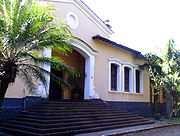 Department of Pathology | 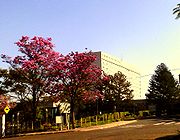 University Hospital | 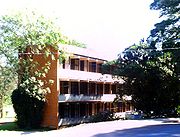 Medical Student Housing |
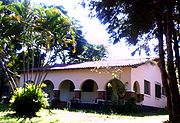 A professor's house | 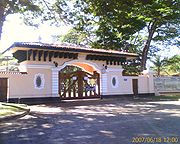 Main gates | 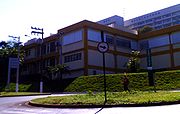 Administration building |

